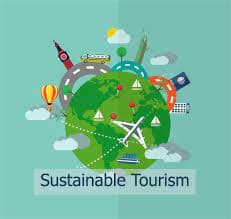Tourism is a huge part of our global culture, allowing us to explore different parts of the world, meet people from different walks of life, and experience new traditions and activities. It brings many benefits to both travellers and communities.
However, the industry is changing. As the years go by, we’re becoming more and more aware of the threat of climate change and our role in increasing it. Across all industries, we are thinking about ways we can lessen our impact on the earth.
Studies shows that tourism accounts for 8% of global greenhouse gas emissions, which is very large when we consider all of the possible sources of emissions. For this reason, it is clear that we need to move towards a more sustainable tourism model.
The main responsibilities of sustainable tourism include:
1. Protecting the environment, natural resources, and wildlife
2. Providing socio-economic benefits for communities who live in tourist destinations
3. Conserving cultural heritage and creating authentic tourist experiences
4. Bringing tourists and local communities together for mutual benefit
5. Creating inclusive and accessible tourist opportunities.
Positive Impacts of the Tourism Industry
Social and Cultural Benefits of Tourism
• Strengthened communities due to more money and resources
• Improved infrastructure including buildings and transport systems
• Higher rates of employment due to the tourism industry
• Improved understanding of different cultures and traditions
• Preservation of local cultures
• Commercialisation of art and culture
• Conservation of heritage including architecture and natural sites
• Increased number of events and celebrations
Environmental Benefits of Tourism
• Creation of natural parks and Areas of Outstanding Natural Beauty
• Reduced numbers of animal poaching
• Improved water quality
• Increased funding for nature conservation and protection
Negative Impacts of the Tourism Industry
Negative Social and Cultural Impacts of Tourism
1. Staged authenticity: This refers to when events or cultures are manufactured just to bring in tourism and money, even when they don’t reflect the local culture of destination communities. This can cause bad feelings between tourists and locals, and can also lead to the eradication of local culture.
2. Standardisation: Often tourists seek familiarity even when they are visiting a foreign country, and this can lead to a loss of cultural diversity. For example, you can find McDonald’s and Starbucks all around the world, and these huge companies can take business from smaller companies.
3. Commodification: It happens when tourism destroys the true meaning of cultural performances, events and customs. Instead, they are transformed to suit the time frames and wishes of tourists. Understandably, this can make local communities feel taken advantage of and disrespected.
Negative environmental impacts of tourism
• Damage of wild habitats due to new infrastructure
• Weakened resilience to natural disasters
• Beautiful scenery ruined by hotels and car parks
• Deforestation
• Overuse of water due to influx of people
• Air pollution due to traffic congestion
• Destruction of nature due to littering and disregard
• Wildlife relocating due to increased noise levels
• Higher consumption of energy
• Plastic pollution in the ocean affecting sea life
How sustainable tourism is providing a solution ?
It’s not just local communities that live in tourist destinations that are feeling the negative effects of tourism. As tourists ourselves, many of us prefer to visit places that are clean, not too crowded, and safe. We also usually want to preserve local cultures, traditions, religions, and buildings.
The World Tourism Organization and the United Nations Environment Program suggested twelve main goals for sustainable tourism in 2005. These will help to demonstrate the ways in which sustainable tourism can provide a solution to some of the global challenges facing the industry today:
1. Economic Viability: To make sure that tourism destinations and businesses are viable, competitive, and able to achieve long-term success.
2. Local Prosperity: To ensure that tourism activities help local communities thrive economically and retain a large amount of the economic contribution.
3. Employment Quality: To increase the number of local jobs created in the tourism industry and ensure that the pay and working conditions are fair, safe and offered to workers without discrimination.
4. Social Equity: To ensure that tourism increases the amount of economic and social benefits being distributed across local communities, improving all areas of life.
5. Visitor Fulfillment: To create a safe and fulfilling holiday experience for tourists without discrimination based on race, gender, sexuality, disability or other.
6. Local Control: To empower local communities to have a role in planning and decision-making regarding tourism in their neighbourhoods.
7. Community Wellbeing: To improve the quality of life and wellbeing of local communities, ensuring they have access to resources and are not disrespected or exploited in the name of tourism.
8. Cultural Richness: To respect the cultural heritage, traditions, authenticity and uniqueness of host communities.
9. Physical Integrity: To look after all landscapes, whether urban or rural, and ensure that they are not degraded physically or visually as a result of tourism.
10. Biological Diversity: To conserve natural areas, wildlife, and unique habitats, protecting them and ensuring they are not damaged.
11. Resource Efficiency: To use sustainable and renewable resources when possible in the development and operation of tourism facilities and services.
12. Environmental Purity: To protect the land, air and water from pollution, littering and other waste that may come as a result of tourism businesses or visitors.
You can learn more about tourism at our Academy. We are always promoting sustainable tourism. We at Guiders Education encourage our students to organize self-sufficient, sustainable camping trip, choosing sites accessible by train or bike? Or something more wildlife-focused, without damaging the environment.







